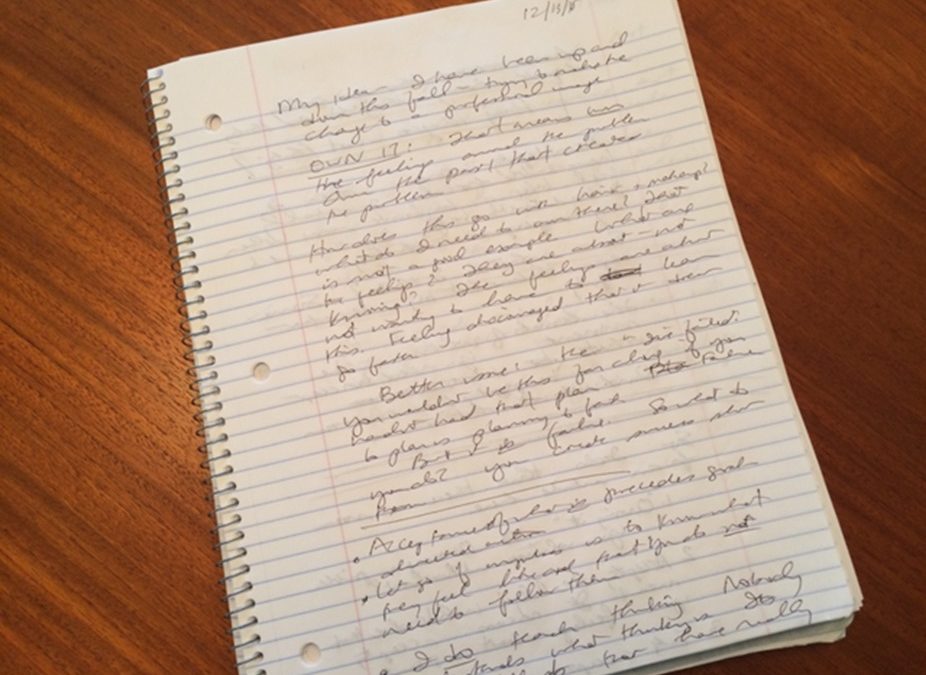Asking yourself questions is essential in thinking. It's the way you get information out of your subconscious and into conscious consideration. Your subconscious is a huge repository of past observations, past conclusions, past training. It is where your expertise...

Thinking on Your Feet
I often get asked how to think on your feet. For example, suppose you are in a meeting, and your boss suddenly turns to you and asks for your opinion. How do you come up with a quick answer? You can't stop to "think on paper" in that situation. First, I want to point...
The Evening Review
To keep on track with a workload, you need to review your progress daily. I generally recommend taking 15 minutes in the morning to see what you got done, and what you need to do. However, there is a good case to be made to spend a little more time to review in the...

Freewriting
Every tactic is useful only in a context. That includes my favorite general-purpose workhorse, "thinking on paper." Sometimes it is more efficient to think in your head. Sometimes it is more efficient to discuss an issue with someone else. And sometimes it is more...
Reminder Cards
I advocate a lot of simple tools. Here's one for remembering good advice: Make a pack of reminder cards. By reminder cards, I literally mean 3"x5" index cards with handwriting on them. So, for example, over the years, I developed a pack of about 30 blue index cards...
The One Thing Missing from the Advice You’ve Gotten from Me
If you've been reading my blog, or my website, you've read about a lot of processes and procedures you can use to help get your mental wheels turning when you're feeling overloaded, or conflicted, or doubtful, or otherwise not sure what to do. They're great ideas....
Using Analogies for Creative Problem Solving
When you are stuck on a problem and need some new ideas, you can get creative ideas by making analogies to some other field. An analogy is an abstract parallel between two quite different things. For example, you might analogize driving to project management. In both...
Getting Out of the “I Don’t Know” Trap
There are two kinds of "I don't know." One kind is accompanied by a sense of bafflement and annoyance. If you put the feeling into words, it would say, "why would you expect me to know that?" That's how you feel when someone asks, "who's the president of Kyrgzstan?"...
Playing Two Thinking Roles Can Ignite Your Thinking
Here's a surprisingly effective technique that can pry information loose from your brain and ignite your thinking when you're stalled: The "Q&A Technique." [1] Here's the technique: Write down a question you are puzzling over. ("How" and "Why" questions are...
The Unfounded Assumption that Can Stop Logical Thinking in Its Tracks
Join me in the campaign to eliminate prejudice against messy thinking tactics. Floating in the back of many people's minds is the idea that "logical" means "neat." People sometimes hesitate to make a list unless they can write down the items in their proper order....
Yes, It’s the Electronic Age, But Don’t Forget Paper-Age Lessons
Here's some old-fashioned advice that may be just what you need to get out of a present-day thinking block: Spread out your notes all over your desk. That's right, your desk, not your computer screen. Yes, programs exist to move around words in many wonderful easy...

The One-Minute Rule for “Thinking on Paper”
If you've followed my work, you know I'm an advocate of "Thinking on Paper." You can watch this 3-minute video explaining "thinking on paper, or read a short write-up on it here. People often ask when they should use "thinking on paper" to speed up their thinking....
Keep It Interesting
Boredom kills concentration, productivity, and pleasure. It's hard to motivate yourself to pay attention when you're bored out of your mind. If you find yourself bored in a meeting or on a project, you need a remedy. Here are three things you can do. One idea is to...
Tip: Three Reasons to Learn a Formula
At a humor workshop I attended recently, Judy Carter taught us a formula for creating a joke around something mean that someone said to us. The steps were: Remember exactly what words were used, plus the tone and body language, so you can act it out. Backtrack: what...

Tackle Tough Long-Term Issues with Three Pages a Day
In Thinking Tactics, I teach a set of thinking procedures that each take under 10 minutes. They can be used to clarify most confusion, resolve most conflicts, and figure out the next step on most projects. But not everything. Sometimes you face a bigger issue — one...







